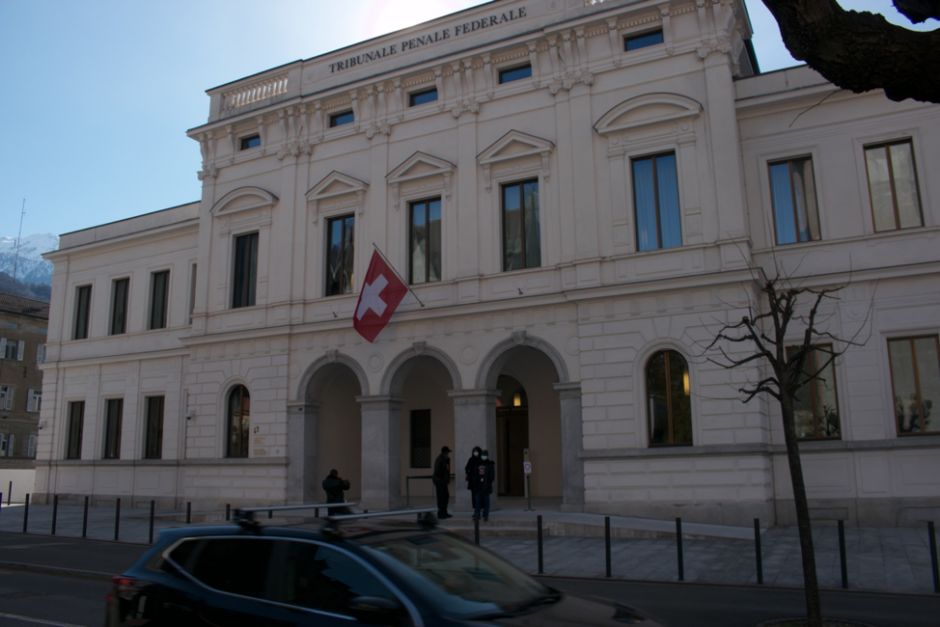
BELLINZONA, Switzerland – Alieu Kosiah killed a man for refusing his order to carry looted goods in the Kolahun region of Lofa County in 1993, a witness told the Swiss Federal Criminal Court prosecuting the former rebel commander on Thursday.
Kosiah killed a man named Musa Kpandeh because he refused to transport looted generator parts, cocoa, coffee and palm oil from Pasolahun to Kolahun, according to the witness, the fourth plaintiff of seven who have brought this war crimes case against Kosiah. The plaintiff said he was one of several young men forced to carry the goods on the 12-hour walk on a dirt road. He said they were not allowed to rest, eat nor drink during the trip.
“Kosiah was talking to him (Kpandeh). He had a pistol in his hand telling the man he would kill him if he got tired carrying the load,” he said. The plaintiff, whose name is being withheld for fear of retaliation, told the three-judge panel that he did not see Kosiah shoot the man but he believes he did.
He said Kpandeh was left on the roadside, stretching, wheezing and dying while he and other townsmen took the goods to a ULIMO warehouse in central Kolahun. “I saw the man fighting for his life in the grass.”
“That was my first time seeing Kosiah. The other ULIMO rebels were calling him ‘CO Kosiah’ and saluting him,” he said.
Kosiah, 45, is accused of murder, looting, forced transportation, rape, sexual enslavement, recruitment of a child-soldier and cannibalism. He is accused of committing the offenses during his time with the United Liberation Movement of Liberia for Democracy (ULIMO) between the early and mid 1990s. Kosiah denies any wrongdoing, saying he was not in Lofa at that time.
The plaintiff also told the court Kosiah and his men killed three other civilians carrying stolen goods and ammunitions for them. Two men—named “Kollie” and Blama Samokai—were killed on that journey Pasolahun to Kolahun, he said. The man, now a construction worker, said he was told by another civilian that Kosiah killed a man named Morlu Kpandeh on the road from Kolahun to Sasahun while he was transporting ammunitions and looted goods. The man said he also saw the bodies of the three other victims.
“He (Morlu) was lying on his back and blood was rolling from under him,” he told the court. The plaintiff’s details of alleged killing, looting and forced transportation were similar to those of another plaintiff who testified before the court on Wednesday.
“They said if you don’t work hard, flies will carry message to your parents,” he said.
The man said he and another civilian managed to escape in Sasahun shortly after.
Dmitri Gianoli, Kosiah’s lawyer, had fewer cross-examination questions for this plaintiff than the three who testified earlier this week. Gianoli continued his effort to sow doubt with the judges, suggesting that investigators have charged the wrong person. He has repeatedly asked witnesses whether there could be another Alieu Kosiah.
On Thursday Gianoli challenged the plaintiff’s knowledge of the alleged victims and their relatives. He grilled the plaintiff over his familiarity of the Gbandi countryside, trying to show the witness was not clear on events that happened nearly 30 years ago. The man answered Gianoli’s questions with clarity and confidence, showing no sign he had forgotten the towns and villages in the area.
In another failed attempt to show the plaintiff’s memory was faulty, Gianoli showed him photos of the men who were killed. The plaintiff clearly identified each of them.
However, as with the three men who testified against Kosiah this week, Gianoli told the court that Thursday’s plaintiff had also failed to identify Kosiah in photos shown to him by investigators in the Swiss city of Bern in 2017. Like the earlier witnesses, Thursday’s plaintiff told the court the pictures were too dark and blurry to recognize anyone.
“I know Kosiah,” the plaintiff told the court. “He is bigger now but he still has the same eyes. I know him from his ways.” Alluding to angry outbursts that Kosiah has made during the proceedings, he said “That is the same way he used to behave when he was vexed. He just killed people for common.” “For common” is a Liberian phrase meaning “with ease.”
The man is one of seven Liberians who brought the complaint with Swiss authorities against Kosiah, who has been residing in Switzerland since 1997. Kosiah has been in custody for six years awaiting this trial, an unusually long time. It is a point Kosiah has raised himself in outbursts repeatedly. All seven alleged victims, referred to as “private plaintiffs” in the Swiss legal system, will have testified by next Monday. Twelve other people—eight prosecution and four defense witnesses—are expected to appear before the court by March 5th.
The case is historic for Switzerland and Liberia. It is the first war crimes trial to be heard in a civilian court under the legal principle of “international jurisdiction” in this central European country, bordering Italy, Germany, Austria and France. Kosiah is the first Liberian to be tried for war crimes in connection to the Liberian Civil War (1989-2003), which killed an estimated 250,000 people and displaced a million.
The trial continues Friday with the fifth private plaintiff. This report was produced in collaboration with New Narratives as part of the West Africa Justice Reporting Project
